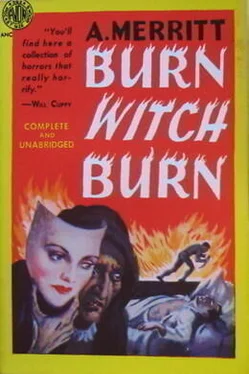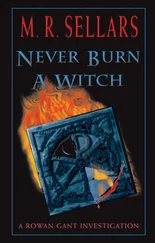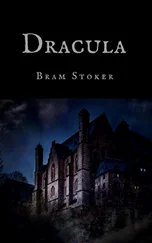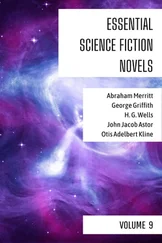I grunted at that! He had put so aptly what I had felt and had not formulated into words.
He started to open the door. He hesitated.
"One thing more. If there should be any telephone calls inquiring as to Peters' condition let one of these men, or their reliefs, answer. If any should come in person making inquiry, allow them to come up—but if they are more than one, let only one come at a time. If any should appear, asserting that they are relations, again let these men meet and question them."
He gripped my hand, then opened the door of the room. Another pair of the efficient–appearing retainers were awaiting him at the threshold. They swung in before and behind him. As he walked away, I saw that he was crossing himself vigorously.
I closed the door and went back into the room. I looked down on Peters.
If I had been religious, I too would have been doing some crossing. The expression on Peters' face had changed. The terror and horror were gone. He still seemed to be looking both beyond me and into himself, but it was a look of evil expectancy—so evil that involuntarily I shot a glance over my shoulder to see what ugly thing might be creeping upon me.
There was nothing. One of Ricori's gunmen sat in the corner of the window, in the shadow, watching the parapet of the church roof opposite; the other sat stolidly at the door.
Braile and Nurse Walters were at the other side of the bed. Their eyes were fixed with horrified fascination on Peters' face. And then I saw Braile turn his head and stare about the room as I had.
Suddenly Peters' eyes seemed to focus, to become aware of the three of us, to become aware of the entire room. They flashed with an unholy glee. That glee was not maniacal—it was diabolical. It was the look of a devil long exiled from his well–beloved hell, and suddenly summoned to return.
Or was it like the glee of some devil sent hurtling out of his hell to work his will upon whom he might?
Very well do I know how fantastic, how utterly unscientific, are such comparisons. Yet not otherwise can I describe that strange change.
Then, abruptly as the closing of a camera shutter, that expression fled and the old terror and horror came back. I gave an involuntary gasp of relief, for it was precisely as though some evil presence had withdrawn. The nurse was trembling; Braile asked, in a strained voice: "How about another hypodermic?"
"No," I said. "I want you to watch the progress of this—whatever it is—without drugs. I'm going down to the laboratory. Watch him closely until I return."
I went down to the laboratory. Hoskins looked up at me.
"Nothing wrong, so far. Remarkable health, I'd say. Of course all I've results on are the simpler tests."
I nodded. I had an uncomfortable feeling that the other tests also would show nothing. And I had been more shaken than I would have cared to confess by those alternations of hellish fear, hellish expectancy and hellish glee in Peters' face and eyes. The whole case troubled me, gave me a nightmarish feeling of standing outside some door which it was vitally important to open, and to which not only did I have no key but couldn't find the keyhole. I have found that concentration upon microscopic work often permits me to think more freely upon problems. So I took a few smears of Peters' blood and began to study them, not with any expectation of finding anything, but to slip the brakes from another part of my brain.
I was on my fourth slide when I suddenly realized that I was looking at the incredible. As I had perfunctorily moved the slide, a white corpuscle had slid into the field of vision. Only a simple white corpuscle—but within it was a spark of phosphorescence, shining out like a tiny lamp!
I thought at first that it was some effect of the light, but no manipulation of the illumination changed that spark. I rubbed my eyes and looked again. I called Hoskins.
"Tell me if you see something peculiar in there."
He peered into the microscope. He started, then shifted the light as I had.
"What do you see, Hoskins?"
He said, still staring through the lens:
"A leucocyte inside of which is a globe of phosphorescence. Its glow is neither dimmed when I turn on the full illumination, nor is it increased when I lessen it. In all except the ingested globe the corpuscle seems normal."
"And all of which," I said, "is quite impossible."
"Quite," he agreed, straightening. "Yet there it is!"
I transferred the slide to the micro–manipulator, hoping to isolate the corpuscle, and touched it with the tip of the manipulating needle. At the instant of contact the corpuscle seemed to burst. The globe of phosphorescence appeared to flatten, and something like a miniature flash of heat–lightning ran over the visible portion of the slide.
And that was all—the phosphorescence was gone.
We prepared and examined slide after slide. Twice more we found a tiny shining globe, and each time with the same result, the bursting corpuscle, the strange flicker of faint luminosity—then nothing.
The laboratory 'phone rang. Hoskins answered.
"It's Braile. He wants you—quick."
"Keep after it, Hoskins," I said, and hastened to Peters' room. Entering, I saw Nurse Walters, face chalk white, eyes closed, standing with her back turned to the bed. Braile was leaning over the patient, stethoscope to his heart. I looked at Peters; and stood stock still, something like a touch of unreasoning panic at my own heart. Upon his face was that look of devilish expectancy, but intensified. As I looked, it gave way to the diabolic joy, and that, too, was intensified. The face held it for not many seconds. Back came the expectancy then on its heels the unholy glee. The two expressions alternated, rapidly. They flickered over Peters' face like—like the flickers of the tiny lights within the corpuscles of his blood. Braile spoke to me through stiff lips:
"His heart stopped three minutes ago! He ought to be dead—yet listen—"
The body of Peters stretched and stiffened. A sound came from his lips—a chuckling sound; low yet singularly penetrating, inhuman, the chattering laughter of a devil. The gunman at the window leaped to his feet, his chair going over with a crash. The laughter choked and died away, and the body of Peters lay limp.
I heard the door open, and Ricori's voice: "How is he, Dr. Lowell? I could not sleep—" He saw Peters' face.
"Mother of Christ!" I heard him whisper. He dropped to his knees.
I saw him dimly for I could not take my eyes from Peters' face. It was the face of a grinning, triumphant fiend—all humanity wiped from it—the face of a demon straight out of some mad medieval painter's hell. The blue eyes, now utterly malignant, glared at Ricori.
And as I looked, the dead hands moved; slowly the arms bent up from the elbows, the fingers contracting like claws; the dead body began to stir beneath the covers—
At that the spell of nightmare dropped from me; for the first time in hours I was on ground that I knew. It was the rigor mortis, the stiffening of death—but setting in more quickly and proceeding at a rate I had never known.
I stepped forward and drew the lids down over the glaring eyes. I covered the dreadful face.
I looked at Ricori. He was still on his knees, crossing himself and praying. And kneeling beside him, arm around his shoulders, was Nurse Walters, and she, too, was praying.
Somewhere a clock struck five.
Chapter II
The Questionnaire
I offered to go home with Ricori, and somewhat to my surprise he accepted with alacrity. The man was pitiably shaken. We rode silently, the tight–lipped gunmen alert. Peters' face kept floating before me.
I gave Ricori a strong sedative, and left him sleeping, his men on guard. I had told him that I meant to make a complete autopsy.
Читать дальше










